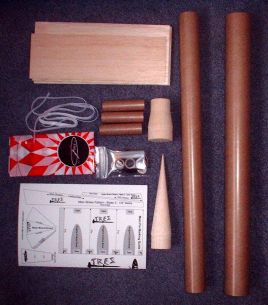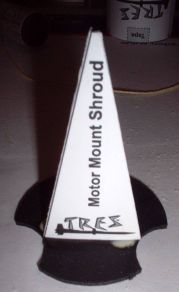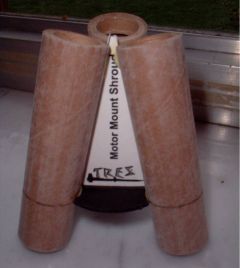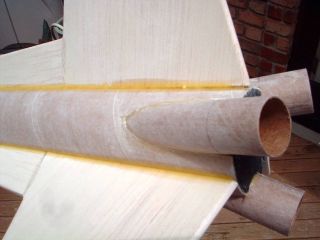| Construction Rating: | starstarstarstarstar_border |
| Flight Rating: | starstarstarstar_borderstar_border |
| Overall Rating: | starstarstarstarstar_border |
| Diameter: | 1.64 inches |
| Length: | 41.52 inches |
| Manufacturer: | FlisKits  |
| Skill Level: | 3 |
| Style: | Cluster, Sport |

Brief:
For those who have outgrown the Deuce's Wild cluster from FlisKits, this
3-motor cluster is the big, bad cousin to the Deuce. With it's huge fins and
giant smoke trails, this rocket will certainly command attention at the pad.
Construction:
The kit includes:
- BT-55 18" body tube (upper)
- BT-60 18" body tube (lower)
- BT-20 motor tubes (3)
- Balsa nose cone
- Balsa fin stock (1/8" lower fins, 3/32" upper fins)
- Custom centering ring for the cluster mount
- 16" plastic chute
- Balsa transition
- Elastic shock cord

As is typical of FlisKits, the instructions were clear and easy to follow with plenty of helpful illustrations. This was especially important with what is a very unusual and relatively difficult cluster mounting arrangement. The instructions also include a nice primer on clustering techniques, though I suspect most customers of this kit have already mastered the basics of clustering.
The clustered-motor assembly is accomplished through a neat little pyramid structure bonded to a custom centering ring. The 3 motor tubes are then bonded to the pyramid, resulting in 3 motors evenly spaced and angled outwards slightly from the center. This is what creates such an awesome cloud of smoke at liftoff.
Since the canted cluster doesn't fit completely into the BT-60 body tube, you must use a template to mark the tube and cut out elliptical slots for the motor tubes. Even with the template, you'll still need to do a test fit and at least one or two trim/cleanup attempts for a perfect fit. After gluing the cluster assembly into the body tube, be sure to apply very generous fillets to the seam between the body tube and the motor tubes.



The upper and lower fins are each sets of 3 and both are two-piece construction, so you'll have lots of tracing, cutting, sanding, and filling to do on this project. These fins seemed huge for the body size, but with 3 angled motors, probably necessary for complete stability. Fins are attached and filleted, and I stepped outside of the standard directions for this, bonding an upper and lower fin at the same time, so that I could lay them on a flat surface to cure. This keeps the upper and lower sets perfectly aligned.
The shock cord is flat elastic attached via an Estes-style tri-fold. This is one weakness in most FlisKits and in particular with a 3-motor cluster, I decided to go with a Kevlar® cord attached to the cluster assembly, attaching the elastic to a loop on the end of the Kevlar®, well protected from ejection blasts.
Finishing:
After generous amounts of diluted Fill 'n' Finish to fill the spirals and balsa
grain, I applied 3 coats of Krylon primer, followed by two coats of a white
base. I then decided to trim the fins red, nose cone and transition blue, and
using the template for a "3" provided in the kit, trimmed a blue
"3" on the lower fins. The header card in the kit shows a very nice
looking black & yellow paint scheme, which would probably have been easier,
but I just happened to be out of yellow paint at the time...
One peeve to the finishing I had was with the "3" template: I found masking and painting six 3's on the lower fins was too time consuming, and even though I was fairly careful, I still got some bleeding through the masking tape. I really think this kit needs either a water-slide decal set or at least some basic vinyl numbers to tack on the 3's.
Construction Rating: 4 out of 5
Flight:
The conditions were very good for first flight, flying on a beautiful spring
day with winds around 8 MPH. I went straight for the max C6-5's (they were on
sale at the local Meier's, which I took as a sign from the rocket gods). I lit
all 3, and the Tres scooted off the pad in a surprising hurry. The three motors
easily overcame the high drag fins, and it started on a fairly straight climb.
For some reason, after climbing about 200 feet, it arced over to a nearly horizontal flight path, then did a couple of winding loops. I'm not sure if this is the wind, a bad motor, or the nature of this beast, but the kids playing soccer nearby loved it. I was a bit disappointed, as I'd had no stability problems at all with my Deuce's Wild.
The chute deployed without a hitch, and everything came back in good shape, ready to fly again. I'll be reloading with B's next time, and will update the flight log below to reflect any improvements in stability.
Recovery:
The 16" chute is a bit small for this, and as noted earlier, I'm no fan of
tri-fold shock cord mount. I'll be upgrading to 18" nylon chute for future
flights, especially if it deploys on a horizontal flight path.
Flight Rating: 3 out of 5
Summary:
This is a very good rocket and great concept from a top-notch company. Of the
many outstanding rockets I've built from Fliskits, this was probably my first
disappointment. That's not to say it's a bad rocket, just that I've never had a
flight problem before and was eager to see this 3-motor trail of smoke.
Hopefully, this was just affected by a gust of wind and will be problem-free in
the future.
Overall Rating: 4 out of 5
Other Reviews
- FlisKits Tres By Warren Wattles
Brief: This is a 3x18mm cluster, vectored-thrust, single stage. Construction: Parts List: 1 BT-55 (18") 1 BT-60 (18") 3 BT-20 (2.75") 1 Balsa nose cone (5 3/8" straight cone) 1 Balsa transition (1") 3 Sheets balsa fin stock (1/8") 1 Sheet balsa fin stock (1/16") 1 Custom laser-cut centering ring 1 Wide shock cord 1 ...
 |
 |
Flights
 |
 |
C.S. (July 2, 2004)
E.J.C. (December 15, 2004)
Sponsored Ads
 |
 |












J.F. (June 11, 2004)